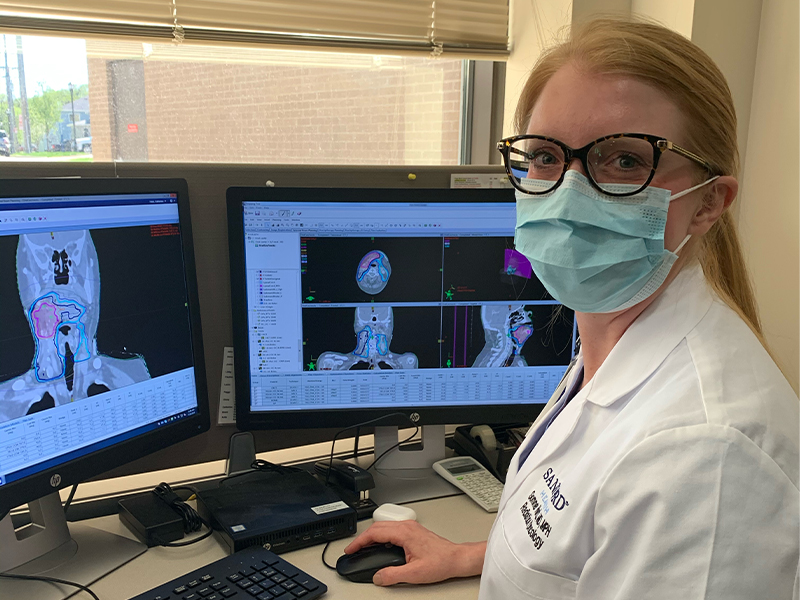“You’ve got cancer.”
Three words no one ever wants to hear, much less during a pandemic.
But that’s the reality the Wittes face.
Scott Witte is an athletic trainer at Sanford Health in Fargo, North Dakota. His wife Tennille was diagnosed with breast cancer on Feb. 13.
Comfort during a difficult time
At home, Scott is there for whatever need Tennille may have. Due to visitor restrictions during the pandemic, he can’t be there when she goes in for treatments.
Even without the presence of the love of her life, Tennille felt reassured, and safe.
The reason? Dr. Sommer Nurkic was there.
“Dr. Nurkic made my wife feel like they were friends, and that she had a friend walking with her during this journey. Since I wasn’t able to be there, it felt like Dr. Nurkic took time to get to know my wife, and know about my family,” said Witte.
Learn more: Cancer care at Sanford Health
“It was really calming for my wife, because it showed that Dr. Nurkic cared about more than just her treatment. She cares about her life outside of this as well,” Scott added.
Understandably, the Wittes were nervous about what treatment sessions would look like during the pandemic. They also expressed concern on the safety and conditions of the Roger Maris Cancer Center.
“Dr. Nurkic took time to explain the things that Sanford is doing to keep patients safe. Obviously, a lot of people there are immunocompromised. They need to have special considerations when they’re getting their treatment. After explaining all that, my wife and I were very confident that going to treatment was the right thing to do at this time.”
Dr. Nurkic says to ensure patient safety, her clinic has:
- Screened patients the day prior to their appointment, and again upon arrival with questions related to COVID-19 symptoms.
- Daily temperature monitoring of everyone who enters the cancer center, including staff.
- Having workflows in place if patients or staff report symptoms of COVID-19, to minimize traffic through the cancer center.
- Asking patients to wear masks while in the center.
- Not allowing patients to have visitors.
- Asking staff to wear both surgical masks and face shields when interacting with patients.
- Maximizing telehealth (video/verbal) visits to minimize traffic in the cancer center.
- Sterilizing treatment equipment and high-traffic patient areas.
- If a patient is being tested for COVID-19, or is COVID-19 positive and it’s appropriate to continue radiotherapy treatments, workflows have been developed to minimize patient and staff exposure.
Tennille enjoyed her time with Dr. Nurkic, and Dr. Nurkic enjoyed her time with Tennille.
“She’s so lovely. Very easy to connect with. She really took breast cancer and the journey of breast cancer on without hesitation, even amid the uncertainty of COVID. She had unwavering strength. It didn’t really require much in the way of support because she herself is the definition of strength in the cancer journey,” she said.
‘It’s just how I was raised’
Dr. Nurkic says when works with patients, she “treats them like family.”
“I think that’s what really drew me specifically to oncology. I get to connect with people, learning so much about them through this really vulnerable cancer journey.”
“I’m grateful to come to work and take care of people because it fills me up.”
Read more
- Health care hero: Doug Nowak, COVID data analytics leader
- Music therapy a calling for Sanford Health’s Anna Mitchell
- Families with special needs face added challenges amid COVID
…
Posted In Cancer, COVID-19, Fargo, Sanford Stories, Specialty Care, Virtual Care
